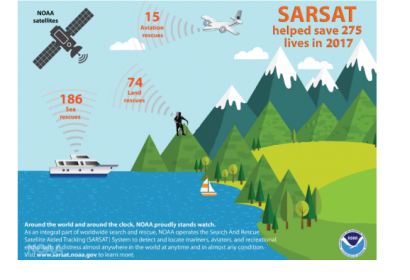275 people were rescued within the United States of America and its surrounding waters in 2017 with the help of satellites operated by the US National Oceanic and Atmospheric Administration (NOAA).
Of the 275 rescues, 186 were in water, 15 were from aviation incidents and 74 were on land using personal locator beacons (PLBs).
The COSPAS-SARSAT system
NOAA satellites are part of COSPAS-SARSAT (Search and Rescue Satellite Aided Tracking) – an international satellite system for search and rescue. The system which uses a network of international spacecraft to detect and locate distress signals quickly from emergency beacons aboard aircraft, boats and from handheld PLBs. The COSPAS-SARSAT programme provides accurate, timely, and reliable distress alert and location data to help Search and Rescue (SAR) authorities to assist persons in distress. The objective of the programme system is to reduce, as far as possible, delays in the provision of distress alerts to SAR services; and the time required to locate a person in distress and to provide assistance, which have a direct impact on the probability of survival of the person in distress at sea or on land.
In the USA, when a NOAA satellite pinpoints the location of a distress signal, the information is relayed to the SARSAT Mission Control Center at NOAA’s Satellite Operations Facility in Suitland, Maryland. From there, the information is quickly sent to Rescue Coordination Centres, operated by either the US Air Force for land rescues, or the US Coast Guard for water rescues.
Since the programme’s inception in 1982, COSPAS-SARSAT has been credited with supporting more than 41,000 rescues worldwide, including more than 8,300 in the US and its surrounding waters. 44 countries and organisations participate in the operation and system including the four parties to the COSPAS-SARSAT International Programme Agreement - Canada, France, Russia and the US.
This article was contributed by Jack Kavanagh, UN Online Volunteer mobilized through www.onlinevolunteering.org.
